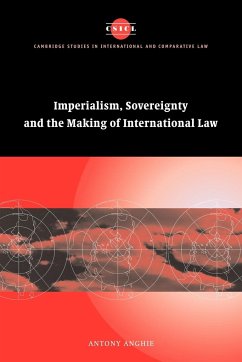Antony Anghie (University of Utah)
Imperialism, Sovereignty and the Making of International Law
Antony Anghie (University of Utah)
Imperialism, Sovereignty and the Making of International Law
- Broschiertes Buch
- Merkliste
- Auf die Merkliste
- Bewerten Bewerten
- Teilen
- Produkt teilen
- Produkterinnerung
- Produkterinnerung
This book examines the relationship between imperialism and international law. It argues that colonial confrontation was central to the formation of international law and, in particular, its founding concept, sovereignty. This book will be of interest to students of international law and relations, history, post-colonial studies and development studies.
Andere Kunden interessierten sich auch für
![The Three Ages of International Commercial Arbitration The Three Ages of International Commercial Arbitration]() Mikael SchinaziThe Three Ages of International Commercial Arbitration129,99 €
Mikael SchinaziThe Three Ages of International Commercial Arbitration129,99 €![International Law-Making by the International Court of Justice and International Law Commission International Law-Making by the International Court of Justice and International Law Commission]() Omri SenderInternational Law-Making by the International Court of Justice and International Law Commission121,99 €
Omri SenderInternational Law-Making by the International Court of Justice and International Law Commission121,99 €![The International Law of Energy The International Law of Energy]() Jorge E. Vinuales (University of Cambridge)The International Law of Energy112,99 €
Jorge E. Vinuales (University of Cambridge)The International Law of Energy112,99 €![The Everyday Makers of International Law The Everyday Makers of International Law]() Tommaso Soave (Budapest Central European University)The Everyday Makers of International Law137,99 €
Tommaso Soave (Budapest Central European University)The Everyday Makers of International Law137,99 €![Strategically Created Treaty Conflicts and the Politics of International Law Strategically Created Treaty Conflicts and the Politics of International Law]() Surabhi Ranganathan (University of Cambridge)Strategically Created Treaty Conflicts and the Politics of International Law48,99 €
Surabhi Ranganathan (University of Cambridge)Strategically Created Treaty Conflicts and the Politics of International Law48,99 €![The International Law of Sovereign Debt Dispute Settlement The International Law of Sovereign Debt Dispute Settlement]() Kei Nakajima (University of Tokyo)The International Law of Sovereign Debt Dispute Settlement129,99 €
Kei Nakajima (University of Tokyo)The International Law of Sovereign Debt Dispute Settlement129,99 €![The Everyday Makers of International Law The Everyday Makers of International Law]() Tommaso Soave (Budapest Central European University)The Everyday Makers of International Law39,99 €
Tommaso Soave (Budapest Central European University)The Everyday Makers of International Law39,99 €-
-
-
This book examines the relationship between imperialism and international law. It argues that colonial confrontation was central to the formation of international law and, in particular, its founding concept, sovereignty. This book will be of interest to students of international law and relations, history, post-colonial studies and development studies.
Hinweis: Dieser Artikel kann nur an eine deutsche Lieferadresse ausgeliefert werden.
Hinweis: Dieser Artikel kann nur an eine deutsche Lieferadresse ausgeliefert werden.
Produktdetails
- Produktdetails
- Cambridge Studies in International and Comparative Law
- Verlag: Cambridge University Press
- Seitenzahl: 380
- Erscheinungstermin: 11. April 2008
- Englisch
- Abmessung: 229mm x 152mm x 23mm
- Gewicht: 604g
- ISBN-13: 9780521702720
- ISBN-10: 0521702720
- Artikelnr.: 22566635
- Herstellerkennzeichnung
- Libri GmbH
- Europaallee 1
- 36244 Bad Hersfeld
- gpsr@libri.de
- Cambridge Studies in International and Comparative Law
- Verlag: Cambridge University Press
- Seitenzahl: 380
- Erscheinungstermin: 11. April 2008
- Englisch
- Abmessung: 229mm x 152mm x 23mm
- Gewicht: 604g
- ISBN-13: 9780521702720
- ISBN-10: 0521702720
- Artikelnr.: 22566635
- Herstellerkennzeichnung
- Libri GmbH
- Europaallee 1
- 36244 Bad Hersfeld
- gpsr@libri.de
Professor of Law at the S. J. Quinney School of Law, University of Utah.
Acknowledgements
Table of cases
Table of treaties
Introduction
1. Francisco de Vitoria and the colonial origins of international law
(i) Introduction
(ii) Vitoria and the problem of universal law
(iii) War, sovereignty and the transformation of the Indian
(iv) Conclusion
2. Finding the peripheries: colonialism in nineteenth-century international law
(i) Introduction
(ii) Elements of positivist jurisprudence
(iii) Defining and excluding the uncivilized
(iv) Native personality and managing the colonial encounter
(v) Reconceptualizing sovereignty
3. Colonialism and the birth of international institutions: the mandate of the League of Nations
(i) Introduction
(ii) Creation of the mandate system
(iii) The league of nations and the new international law
(iv) The mandate system and colonial problems
(v) The mandate system and the construction of the non-European state
(vi) Government, sovereignty, and economy
(vii) The mandate and the discussion of sovereignty
(viii) The legacies of the mandate system: toward the present
(ix) Conclusion
4. Sovereignty and the post-colonial state
(i) Introduction
(ii) Decolonization and the universality of international law
(iii) Development, nationalism and the post-colonial state
(iv) Development and the reform of international law
(v) Permanent sovereignty over natural resource and the new international economic order
(vi) The 1962 resolution on PSNR
(vii) The 1974 charter of rights and duties among states
(viii) Colonialism and the emergence of transnational law
(ix) Sources of law and international contracts
(x) Overview and conclusions
5. Governance and globalization, civilization and commerce
(i) Introduction
(ii) Good governance and the third world
(iii) Governance, human rights and the universal
(iv) International financial institutions, human rights and good governance
(v) International financial institutions and the mandate system
(vi) Conclusions and overview
6. On making war on the terrorists: imperialism as self-defense
(i) Introduction
(ii) The war against terrorism (WAT)
(iii) The United States and imperial democracy
(iv) Historical origins: war, conquest and self-defense
(v) Terrorism and the United Nations: a Victorian moment
(vi) Terrorism, self-defense and third world sovereignty
Conclusion.
Table of cases
Table of treaties
Introduction
1. Francisco de Vitoria and the colonial origins of international law
(i) Introduction
(ii) Vitoria and the problem of universal law
(iii) War, sovereignty and the transformation of the Indian
(iv) Conclusion
2. Finding the peripheries: colonialism in nineteenth-century international law
(i) Introduction
(ii) Elements of positivist jurisprudence
(iii) Defining and excluding the uncivilized
(iv) Native personality and managing the colonial encounter
(v) Reconceptualizing sovereignty
3. Colonialism and the birth of international institutions: the mandate of the League of Nations
(i) Introduction
(ii) Creation of the mandate system
(iii) The league of nations and the new international law
(iv) The mandate system and colonial problems
(v) The mandate system and the construction of the non-European state
(vi) Government, sovereignty, and economy
(vii) The mandate and the discussion of sovereignty
(viii) The legacies of the mandate system: toward the present
(ix) Conclusion
4. Sovereignty and the post-colonial state
(i) Introduction
(ii) Decolonization and the universality of international law
(iii) Development, nationalism and the post-colonial state
(iv) Development and the reform of international law
(v) Permanent sovereignty over natural resource and the new international economic order
(vi) The 1962 resolution on PSNR
(vii) The 1974 charter of rights and duties among states
(viii) Colonialism and the emergence of transnational law
(ix) Sources of law and international contracts
(x) Overview and conclusions
5. Governance and globalization, civilization and commerce
(i) Introduction
(ii) Good governance and the third world
(iii) Governance, human rights and the universal
(iv) International financial institutions, human rights and good governance
(v) International financial institutions and the mandate system
(vi) Conclusions and overview
6. On making war on the terrorists: imperialism as self-defense
(i) Introduction
(ii) The war against terrorism (WAT)
(iii) The United States and imperial democracy
(iv) Historical origins: war, conquest and self-defense
(v) Terrorism and the United Nations: a Victorian moment
(vi) Terrorism, self-defense and third world sovereignty
Conclusion.
Acknowledgements
Table of cases
Table of treaties
Introduction
1. Francisco de Vitoria and the colonial origins of international law
(i) Introduction
(ii) Vitoria and the problem of universal law
(iii) War, sovereignty and the transformation of the Indian
(iv) Conclusion
2. Finding the peripheries: colonialism in nineteenth-century international law
(i) Introduction
(ii) Elements of positivist jurisprudence
(iii) Defining and excluding the uncivilized
(iv) Native personality and managing the colonial encounter
(v) Reconceptualizing sovereignty
3. Colonialism and the birth of international institutions: the mandate of the League of Nations
(i) Introduction
(ii) Creation of the mandate system
(iii) The league of nations and the new international law
(iv) The mandate system and colonial problems
(v) The mandate system and the construction of the non-European state
(vi) Government, sovereignty, and economy
(vii) The mandate and the discussion of sovereignty
(viii) The legacies of the mandate system: toward the present
(ix) Conclusion
4. Sovereignty and the post-colonial state
(i) Introduction
(ii) Decolonization and the universality of international law
(iii) Development, nationalism and the post-colonial state
(iv) Development and the reform of international law
(v) Permanent sovereignty over natural resource and the new international economic order
(vi) The 1962 resolution on PSNR
(vii) The 1974 charter of rights and duties among states
(viii) Colonialism and the emergence of transnational law
(ix) Sources of law and international contracts
(x) Overview and conclusions
5. Governance and globalization, civilization and commerce
(i) Introduction
(ii) Good governance and the third world
(iii) Governance, human rights and the universal
(iv) International financial institutions, human rights and good governance
(v) International financial institutions and the mandate system
(vi) Conclusions and overview
6. On making war on the terrorists: imperialism as self-defense
(i) Introduction
(ii) The war against terrorism (WAT)
(iii) The United States and imperial democracy
(iv) Historical origins: war, conquest and self-defense
(v) Terrorism and the United Nations: a Victorian moment
(vi) Terrorism, self-defense and third world sovereignty
Conclusion.
Table of cases
Table of treaties
Introduction
1. Francisco de Vitoria and the colonial origins of international law
(i) Introduction
(ii) Vitoria and the problem of universal law
(iii) War, sovereignty and the transformation of the Indian
(iv) Conclusion
2. Finding the peripheries: colonialism in nineteenth-century international law
(i) Introduction
(ii) Elements of positivist jurisprudence
(iii) Defining and excluding the uncivilized
(iv) Native personality and managing the colonial encounter
(v) Reconceptualizing sovereignty
3. Colonialism and the birth of international institutions: the mandate of the League of Nations
(i) Introduction
(ii) Creation of the mandate system
(iii) The league of nations and the new international law
(iv) The mandate system and colonial problems
(v) The mandate system and the construction of the non-European state
(vi) Government, sovereignty, and economy
(vii) The mandate and the discussion of sovereignty
(viii) The legacies of the mandate system: toward the present
(ix) Conclusion
4. Sovereignty and the post-colonial state
(i) Introduction
(ii) Decolonization and the universality of international law
(iii) Development, nationalism and the post-colonial state
(iv) Development and the reform of international law
(v) Permanent sovereignty over natural resource and the new international economic order
(vi) The 1962 resolution on PSNR
(vii) The 1974 charter of rights and duties among states
(viii) Colonialism and the emergence of transnational law
(ix) Sources of law and international contracts
(x) Overview and conclusions
5. Governance and globalization, civilization and commerce
(i) Introduction
(ii) Good governance and the third world
(iii) Governance, human rights and the universal
(iv) International financial institutions, human rights and good governance
(v) International financial institutions and the mandate system
(vi) Conclusions and overview
6. On making war on the terrorists: imperialism as self-defense
(i) Introduction
(ii) The war against terrorism (WAT)
(iii) The United States and imperial democracy
(iv) Historical origins: war, conquest and self-defense
(v) Terrorism and the United Nations: a Victorian moment
(vi) Terrorism, self-defense and third world sovereignty
Conclusion.








